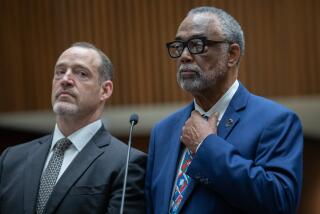White House Aide Faces Possible Conflict of Interest : Ethics: Competitiveness Council official may have influenced rules affecting firm in which he owns stock.
- Share via
WASHINGTON — The executive director of a controversial White House review panel was involved in recent efforts to weaken a proposed federal rule affecting a utility company in which he has a personal financial interest, according to documents released Thursday.
The new disclosures regarding Allan B. Hubbard, executive director of the President’s Council on Competitiveness, follow earlier allegations that he may have influenced decisions that could affect a chemical firm in which he has a financial stake.
The House Energy and Commerce subcommittee on health and environment, which has been examining Hubbard’s financial records, believes that the new information represents a potentially more “flagrant” conflict of interest, said panel chairman Henry A. Waxman (D-Los Angeles).
Hubbard declined to comment on the charges and a council spokesman denied that Hubbard’s financial holdings represent a potential violation of ethics rules.
Both of the alleged conflicts involve the role of the Competitiveness Council, chaired by Vice President Dan Quayle, in drafting new rules that industries must follow to comply with the 1990 Clean Air Act.
Hubbard became the focus of an informal subcommittee investigation last month when concerns were raised by environmentalists about his co-ownership of an Indianapolis chemical plant that presumably would be affected by the new pollution control regulations.
The White House said at the time that it was satisfied there was no conflict caused by Hubbard’s $1-million stake in World Wide Chemical Inc., a manufacturer of automotive cleaners and waxes, and his duties on the Competitiveness Council.
According to a report prepared by Waxman’s subcommittee, as well as other documents and information made available to the Los Angeles Times, Hubbard’s financial interest in an Indiana utility may represent a second potential conflict in light of the council’s regulatory actions.
The information indicates that Hubbard was involved in efforts to persuade the Environmental Protection Agency to weaken a rule that it had proposed to help monitor sulfur dioxide emissions by utility companies facing stiff new cleanup requirements under the Clean Air Act. Sulfur dioxide is the principal component of acid rain.
The Competitiveness Council, at an Oct. 16 meeting chaired by Hubbard, proposed changes in the regulation that satisfied objections raised earlier by Public Service Co. of Indiana, the third-largest source of sulfur dioxide emissions in the nation.
According to his financial disclosure forms, Hubbard owns Public Service stock that is worth somewhere between $15,000 and $50,000.
Because no written records are kept of the council’s deliberations, there is no direct evidence to either support or disprove the assertion that Hubbard may have allowed his financial interests in Public Service to influence his position on the acid rain ruling. Such a conflict, if it occurred, would be in clear violation of federal ethics laws.
Moreover, Hubbard’s interest in the company, while significant, constitutes only a small fraction of his net worth, which is estimated on his disclosure forms to be in excess of $3.7 million.
Nevertheless, Waxman and other critics argued that Hubbard’s varied interests in numerous industries subject to regulation under the Clean Air Act should disqualify him from participating in policy decisions affecting those industries.
“It is a reflection of how far beyond the bounds of reasonable behavior the vice president’s Council on Competitiveness has gone that they would allow a stockholder of one of the most highly polluting electrical utilities in the country to dictate changes in EPA’s acid rain rules,” Waxman said.
A council spokesman, Jeff Nesbitt, disputed Waxman’s charges. He said that Hubbard had never made a secret of his Public Service holdings and had received a special waiver from Quayle last May to work on regulatory issues provided they had no direct or substantial impact on his particular financial interests.
“There is a vast, vast difference between participation in decisions that will have a direct, specific impact on a particular company and participation in these broad policy discussions affecting industry in general,” Nesbitt said.
More to Read
Get the L.A. Times Politics newsletter
Deeply reported insights into legislation, politics and policy from Sacramento, Washington and beyond. In your inbox twice per week.
You may occasionally receive promotional content from the Los Angeles Times.










